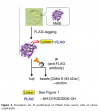Murine Rnase Inhibitors Effectively Solve the Problem of RNase Contamination
In the vast field of life science research, the stability and integrity of RNA (ribonucleic acid) is crucial to the success of many experiments. RNA, as a messenger of genetic information, plays a core role in various biological processes within cells. However, the fragility of RNA, especially its high sensitivity to ribonucleases (RNases), has been a significant challenge for researchers. RNases are a class of enzymes widely present that can catalyze the degradation of RNA into small RNA molecules, and even minute RNase contamination can lead to complete degradation of RNA samples. This degradation not only affects the accuracy of experimental results but could even lead to the failure of entire studies. Therefore, preventing RNase contamination and protecting the integrity of RNA has become a key consideration in the design of many experiments.
To tackle this challenge, Glpbio, a global leader in high-performance life science products, has launched the murine RNase inhibitor. The launch of this product marks an important step in addressing the issue of RNase contamination, providing strong support for life science research.
Overview of Murine RNase Inhibitor
The murine RNase inhibitor is a 50 kD recombinant protein isolated from Escherichia coli, containing the murine RNase inhibitor gene. The core of this innovative product lies in its specific inhibitory effect on RNase A, B, and C, while it does not inhibit other types of RNases such as RNase 1, RNase T1, S1 Nuclease, RNase H, or Aspergillus RNase. This specificity makes murine RNase inhibitors an excellent choice for preventing RNA degradation in various experimental applications.
Notably, the murine RNase inhibitor can bind non-covalently to various RNases in a 1:1 ratio, exhibiting extremely high affinity. This characteristic means that even in the presence of highly active RNases, the murine RNase inhibitor can effectively protect RNA from degradation, ensuring the accuracy and reliability of experimental results. This powerful protective capability allows researchers to focus more on the experiments themselves without overly worrying about RNA degradation.
Unique Advantages of Murine RNase Inhibitor
Compared to human and porcine ribonuclease inhibitors, the murine RNase inhibitor exhibits significant advantages in terms of antioxidant properties. The human RNase inhibitor contains a pair of cysteines that are very sensitive to oxidation, easily leading to inhibitor inactivation. In contrast, the Mouse RNase Inhibitor lacks this pair of cysteines, thus greatly enhancing its antioxidant capacity. Even in an environment with low concentrations of DTT (less than 1 mM), the murine RNase inhibitor remains stable, making it the preferred choice for reactions requiring low concentrations of DTT, such as real-time RT-PCR. This feature allows the murine RNase inhibitor to perform excellently under various experimental conditions, providing researchers with more experimental options.
Versatility of Murine RNase Inhibitor
The extensive applicability of the murine RNase inhibitor is another highlight. Whether it is RT-PCR, cDNA synthesis, in vitro transcription, enzymatic RNA labeling reactions, or any other application requiring protection against RNA degradation, the murine RNase inhibitor performs exceptionally well. Notably, in the presence of AMV or M-MuLV reverse transcriptase, taq DNA polymerase, or SP6/T7/T3 RNA polymerase, the murine RNase inhibitor does not inhibit these enzymes' activities, meaning it can effectively protect RNA from degradation without interfering with the activities of other enzymes. This versatility makes the murine RNase inhibitor an indispensable tool in many laboratories, significantly advancing RNA-related research.
Glpbio's Innovation and Excellence
As a global leader in high-performance life science products, Glpbio is dedicated to providing comprehensive research materials and reliable product performance for biomedical research. Our core philosophy is“ensuring the quality of every product,” reflected not only in the murine RNase inhibitor but also in over 20,000 life science research reagents we offer, including GPCR ligands, neurotransmitters, ion channel, and signaling inhibitors, and various chemical small molecules and peptides. Glpbio's products are widely used by global customers, and our mission is to make the most innovative life science reagents easily accessible to scientists worldwide, helping them achieve significant scientific discoveries faster.
To achieve this mission, Glpbio continuously invests in research and development, striving to launch more innovative life science products. We have a professional R&D team and advanced production equipment, ensuring that each product undergoes strict quality control and performance testing. Our products are not only extensively used in preclinical research on human diseases but also have broad potential applications, contributing to the continuous progress and development of the life sciences field.
In summary, the launch of the murine RNase inhibitor undoubtedly brings a revolution to the field of life science research. It effectively addresses the long-standing issue of RNase contamination and provides strong support for various experiments requiring the protection of RNA integrity.











Comentarios